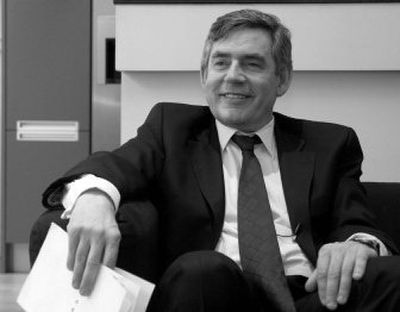U.S. ties may burden British leader

LONDON – Gordon Brown, who is set to become prime minister of Britain on June 27, was sitting in the White House one day last month chatting with national security adviser Stephen Hadley when, as Brown later put it, “President Bush happened to drop in for a meeting.”
Two of the world’s most powerful politicians, in their first substantial conversation, chatted for 45 minutes about Iraq, Afghanistan and world trade. White House officials said the meeting was hardly happenstance but planned in advance.
The fact that the icebreaking session was held so quietly, and that the British finance minister so carefully played down his first meeting with the U.S. president, illustrates the pickle in which Brown finds himself as he prepares to take over from Prime Minister Tony Blair.
Brown, 56, has more knowledge and experience regarding the United States than perhaps any British leader in history, according to analysts here. He has studied U.S. politics, economics and social policy intimately. He vacations on Cape Cod and has extraordinarily close friendships in U.S. political circles.
But analysts here say the British public’s toxic feelings toward Bush and the Iraq war – and Blair’s unyielding support for both – mean that Prime Minister Brown will have to maintain a certain distance from the White House, at least until next year’s presidential election.
“His personal relations with Bush will be much cooler, and deliberately so,” said James Naughtie, a prominent BBC radio broadcaster who wrote a book about the relationship between Brown and Blair. “He won’t stand up and take Bush on in some crude way. But I would not be at all surprised if over the next six or nine months there is some collision, and headlines here say relations with Washington have cooled. Brown knows that large numbers of people in this country would say, ‘At last!’ “
Brown and Blair, whose partnership and rivalry have dominated British politics for a decade, based their political coming-of-age largely on an American model: Bill Clinton’s 1992 election victory.
That year, the two ambitious young politicians saw their Labor Party drubbed yet again by the Conservative Party. Brown and Blair decided that if they were to end Labor’s time in the wilderness, by then almost 15 years, they needed to learn from the modern political machine the U.S. Democrats had built in Little Rock.
Brown, the serious, intellectual son of a no-nonsense Scottish minister, traveled to the United States to see how Clinton and freewheeling aides such as James Carville created politics and policy and sold them to the public. Over the years Brown has become friends with key Democratic figures, including political strategist Bob Shrum and Sen. Edward Kennedy, of Mass.
He has remained a regular visitor to the United States. “The first thing he does when he goes to America is to go to Barnes & Noble and load up on the latest political and economic books,” Naughtie said. “He is steeped in the whole public discourse in America in a way that Blair isn’t.”
What Brown learned in the early 1990s he brought back to Britain, where he and Blair created New Labor and employed many Clinton-inspired techniques and policies – not the least of which was the wisdom of moving a traditionally left-wing party to the political center. They won a landslide victory in 1997.
Blair, the telegenic communicator, became prime minister and, in a secret political deal endlessly speculated upon here, the brooding and wonkish Brown became chancellor of the exchequer, Britain’s finance minister. Blair kept control of foreign policy and key areas such as education, but essentially ceded economic policy and much of the domestic agenda to Brown, who has become the longest-serving chancellor since the 1820s.
Brown’s close friend and economic adviser, former U.S. Federal Reserve Chairman Alan Greenspan, who has visited Brown in his Scottish hometown of Kirkcaldy, once described him as “without peer among the world’s economic policymakers.”
Now, as Brown prepares to take power, analysts say he must prove himself in foreign affairs. Brown has been a fervent supporter of development, anti-poverty and HIV/AIDS programs in Africa, but largely absent on other major international issues.
“Gordon Brown plays his cards very close to his chest,” said Anthony King, professor of British government at the University of Essex. “Given that he’s been in public life for 20 years, it’s remarkable how little people think they know about what he’s likely to do next. His pronouncements on Iraq are deliberately vague; you’re not meant to know what he thinks. He makes the Sphinx look voluble.”
None of the analysts interviewed said they anticipated major or immediate foreign policy changes under Brown. Blair has already announced that Britain will reduce its troop presence in Iraq to about 5,000 by this summer, and the analysts say Brown is not likely to make dramatic changes to that strategy.
They say Brown is likely to continue a long-standing British commitment to seeking solutions to the Israeli-Palestinian conflict. It is unclear how Brown will handle Iran’s nuclear ambitions, although Naughtie said Brown might be more likely than Blair to get involved in direct talks with Tehran.
One of Brown’s priorities will be to distinguish himself from Blair, whose once-soaring approval ratings now stand at 28 percent, largely because of Iraq and the widely held British perception that Blair has been “Bush’s poodle.” At the same time, the analysts said, Brown will be careful not to damage relations with Britain’s most important ally.
“The Labor Party does expect some clear blue water between Brown and Blair in order to start the healing process after Iraq,” said Mark Leonard, director of the European Council on Foreign Relations, a policy group. “But Brown will have a subtle balancing act in the near term. He’s not going to be a poodle; he is going to assert British interests. But there will be no open breach with the White House.”